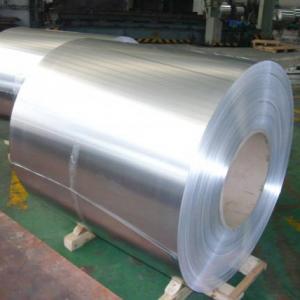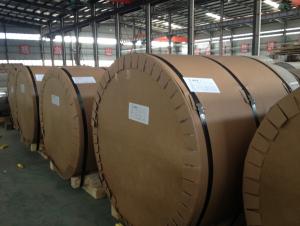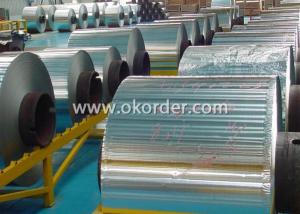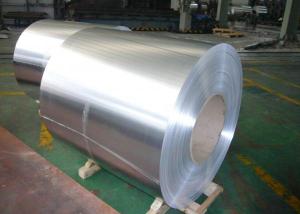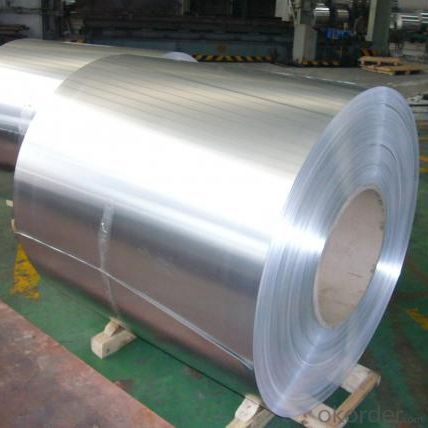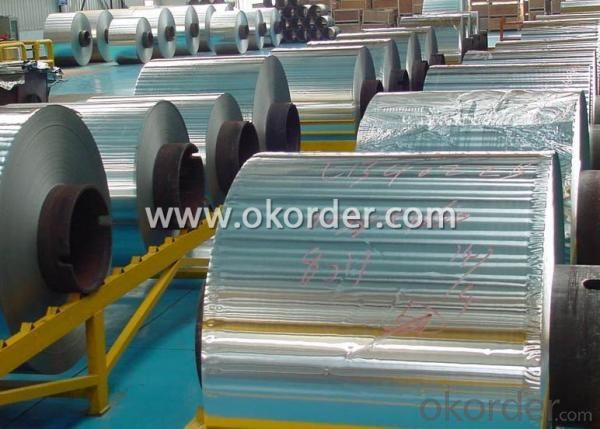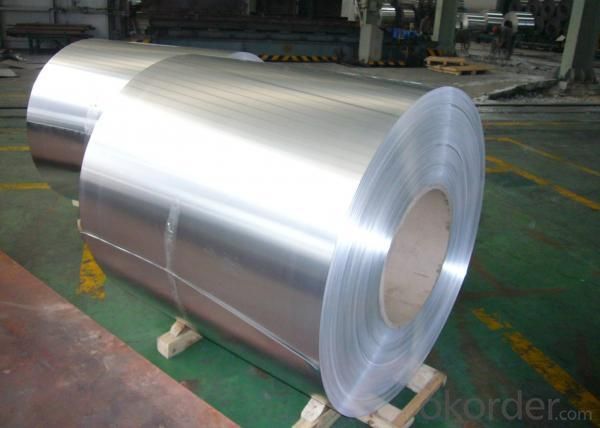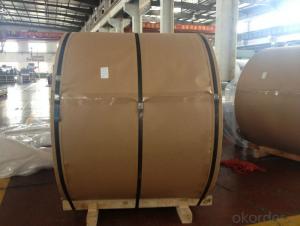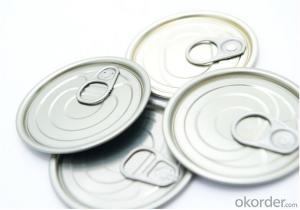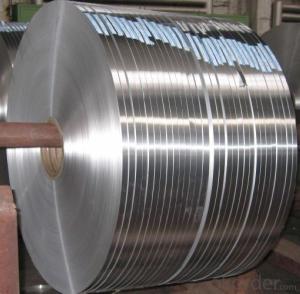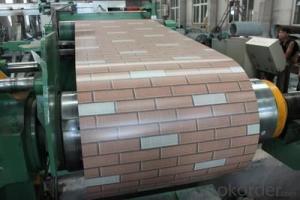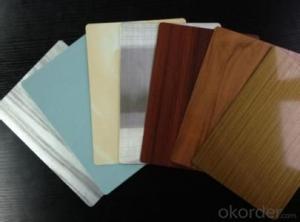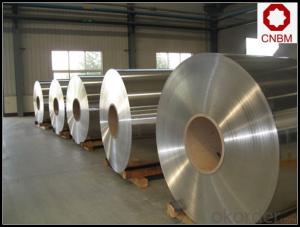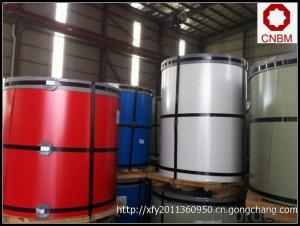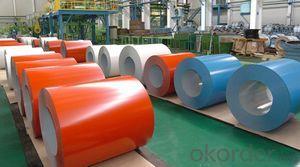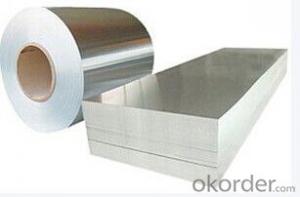Aluminum Coil Lowes 3105 Aluminium Coils Products
- Loading Port:
- China main port
- Payment Terms:
- TT or L/C
- Min Order Qty:
- 3000 m.t.
- Supply Capability:
- 10000 m.t./month
OKorder Service Pledge
OKorder Financial Service
You Might Also Like
1. Specifications of 3105 Aluminium Coils
Alloy | AA3105 |
Temper: | H12, H14, H16, H18, H22, H24, H26, H32,HO, F |
Thickness: | 0.10-500mm |
Width: | 10mm- 2200mm |
Standard: | GB/T3880-2006, ASTM, ISO, EU standard |
Special Specification is available on customer’s requirement | |
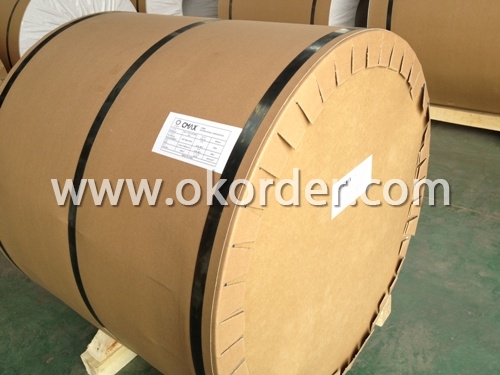
2. Applications of 3105 Aluminium Coils
3105 Aluminium Coils are of high plasticity, hard in corrosion, good at electrical and thermal conductivity.
3105 Aluminium Coils are widely used in air conditioner, aluminium composite panel, aluminium ceiling, road traffic sign, decoration, cover material, piping, refrigeration, automobile, etc.
3. Package & Delivery of 3105 Aluminium Coils
Seaworthy package, water-proof paper wrapped inside, carton wrapped outside in wooden pallets by 20FCL or 40GP.
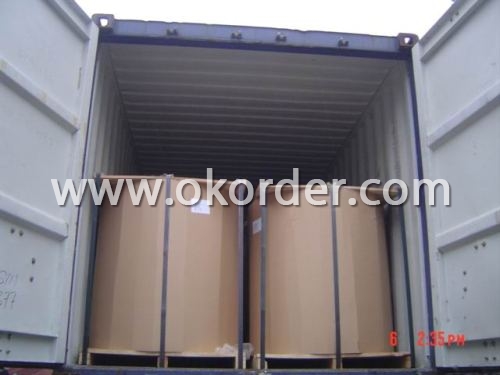
4. Production Flow of 3105 Aluminium Coils
The main producingprocedure includes the following steps:
Rolling--Annealing--Slitting--Sawing, Cut-To-Length, Shearing
New research shows that the future of automotive aluminum sheet demand will grow at an unprecedented rate. 2014 and 2015 is considered to be an turning point that steering the automotive industry from the traditional steel to other lightweight materials and aluminum sheet, including the use of aluminum sheet instead of advanced high strength steels (AHSS).
Promote energy saving in the global situation, the lightweight technology of the automobile industry brought to the agenda. Automobile cover of aluminum alloy sheet is a simple and effective way to reduce the weight. Automotive aluminum sheet high-end aluminum species in one, because of its performance (shaping, connections, etc.) and surface quality of the stringent requirements, but also to the processing of raw materials made finer control management requirements.
Overall, the use of aluminum sheet and other lightweight materials will become a significant feature of heavy vehicles, such as pickup, SUV and so on. The AHSS is likely to continue in light vehicles in use, this can reduce the body weight of about 100 kg.
The use of aluminum sheet in automobiles processing of raw materials and production processes impact on the environment, but in the use phase will reduce the environmental impact. The most critical thing is that the entire life cycle of the cars with the use of aluminum will reduce the impact of environment. Thus, in the automotive industry, using aluminum sheet instead of steel will continue be the develop trend.
2012--2015 years, the North American light vehicle aluminum consumption grew by 28% (growth of automobile production and the growth of the aluminum material content). 2025, pickup body portion 75% of the train will be composed of aluminum material, large cars 24%, SUV22%, 18% other small vehicles.
The popularity of the automobile industry is the development and application of energy, environmental protection and safety of these three issues are closely related. Although the car as a symbol of modernization and social development, social progress and brought prosperity, but also brought energy, environmental protection, transportation, land and other issues. Undoubtedly, these require the auto industry itself and related industries to explore joint research to be resolved.
Most of the domestic automobile industry, aluminum production companies do not have the background and related technology base, still in imitation stage abroad, the theoretical mechanism and technically at a disadvantage.
North American and European automotive aluminum content will be the highest, in addition to Asia (especially China) is still the largest market for lightweight vehicles.
- Q: This question asks for a comparison between cold rolling and hot rolling processes, specifically in the context of steel wire production for coilings.
- <p>Cold rolling and hot rolling are two distinct processes used in the manufacturing of steel wires for coilings. Hot rolling is performed at high temperatures, typically above the recrystallization temperature of the steel, which allows the material to be shaped more easily. This process results in a more ductile and less hard steel, which can be beneficial for certain applications. However, hot-rolled steel may have a rougher surface and may require further processing to achieve desired dimensions and surface finish. Cold rolling, on the other hand, is done at room temperature, which imparts a harder and smoother surface to the steel. It is more precise and results in tighter tolerances, making it suitable for applications requiring high strength and precision. Cold-rolled steel also has better surface finish and dimensional accuracy compared to hot-rolled steel. However, cold rolling is more energy-intensive and may not be suitable for very thick materials due to the increased hardness of the steel at room temperature.</p>
- Q: Can aluminum coils be used in marine applications?
- Marine applications can indeed utilize aluminum coils. The popularity of aluminum in this field can be attributed to its remarkable resistance to corrosion, lightweight nature, and impressive strength-to-weight ratio. Boats, ships, and other marine structures are commonly constructed using aluminum due to these advantages. Specifically, aluminum coils are especially valuable in marine applications because they can be easily shaped and sized to fit different marine industry parts and components. Moreover, these coils possess the ability to endure harsh marine environments and exhibit exceptional resistance to corrosion caused by saltwater, a major concern in marine applications. All in all, the utilization of aluminum coils in marine applications is a dependable and efficient choice.
- Q: Is aluminium a safe metal to put in ones mouth without any side effects?
- yes because saliva cannot break down aluminium. Saliva can only break down starch like break using it's enzymes(amylase)
- Q: How much is aluminum-plastic panel with the 0.155mm thick aluminum per ton?
- The price is around 17000 yuan per ton, but you need to take the surface effect into account
- Q: How are aluminum coils tested for quality?
- To ensure compliance with the necessary standards, a variety of methods are employed to test the quality of aluminum coils. Trained personnel conduct visual inspections to identify any visible defects, such as scratches, dents, or surface imperfections. Likewise, dimensional inspections are carried out, utilizing precision instruments to measure the thickness, width, and length of the coils. This guarantees that the coils are manufactured within the specified tolerances. Furthermore, mechanical testing is performed to evaluate the strength and durability of the aluminum coils. Tensile and yield strength tests measure the maximum load a coil can endure without breaking or deforming, while bend tests assess flexibility and resistance to cracking. Moreover, chemical composition analysis is conducted to verify the purity and consistency of the aluminum material. Spectroscopy techniques, such as atomic absorption or emission spectroscopy, are commonly employed to determine the exact elemental composition of the coils. Coating tests are also conducted to assess the quality of any protective or decorative coatings applied to the aluminum coils. These tests include adhesion testing, corrosion resistance testing, and evaluation of color consistency. In addition to these conventional methods, advanced non-destructive testing techniques are utilized to detect any internal flaws or defects in the coils. Ultrasonic testing, eddy current testing, and X-ray inspection are employed to identify hidden defects without causing damage to the material. Ultimately, a combination of visual, dimensional, mechanical, chemical, and non-destructive tests ensures that aluminum coils meet the necessary quality standards before being utilized in various industries, such as construction, automotive, or electronics.
- Q: Can aluminum coils be used for radiation shielding?
- Indeed, radiation shielding can be accomplished using aluminum coils. Owing to its substantial atomic number and density, aluminum is frequently employed as a radiation shielding material, demonstrating remarkable proficiency in absorbing and dispersing radiation. It effectively safeguards against an extensive spectrum of radiation varieties, encompassing gamma rays and X-rays. Moreover, aluminum possesses the advantageous qualities of being lightweight and pliable, rendering it convenient to manipulate and appropriate for a wide range of situations necessitating radiation shielding. These encompass domains such as medical imaging, nuclear power plants, and the aerospace industry.
- Q: I am looking for a place where I can have my aluminium channels anodized in Erode.
- KSR Agency Products Services Aluminum AnodisingAluminum ExtrusionsArchitectural GlassesBus BarComposite Panels Elevation Glass FittingsFalse CeilingHeat Sink Sections About Us KSR Agency is well-known, veteran-owned business enterprise. Our company is a promising manufacturer and supplier of wide range of Aluminum Extrusion channels and Anodizing Aluminum that includes the following products o Glass Fittings for Elevation o Bus Bars o Heat Sink Sections o Aluminum Extrusions o Architectural Glasses o False ceiling o Partitions o Composite Panels Our Anodizing methodologies: o Type I - Chromic Acid Anodize o Type II - Sulphuric Acid Anodize o Type III - Hard Anodize o Class 1 - Non-dyed o Class 2 - Dyed Our range of products has huge demand and widely accepted by many people all across for their outstanding features and are available in various patterns, designs, sizes, shapes. We use the best grade raw material and advanced methods of production in the process of manufacturing these products. Our products meet the international standards in quality that assures excellent performance in usage and customized as per the clients' specification and necessity. We deliver the orders within a stipulated time frame. Contact Details KSR Agency No. 45, Mudali Thottam, Bharathi Nagar, Sulai, Chittode Road, Erode - 638004, Tamil Nadu, India Mr. Sendhil Kumar +(91)-9739956109 Mr. Rajendran +(91)-9842876614
- Q: How do aluminum coils contribute to the electrical conductivity of products?
- Due to its excellent conductivity properties, aluminum coils find widespread use in electrical applications. With its high electrical conductivity, aluminum serves as an ideal material for the transmission and distribution of electrical power. The utilization of aluminum coils in products promotes the smooth flow of electric current. Thanks to its low resistance to the flow of electricity, aluminum enables efficient transmission of electrical energy. This low resistance guarantees minimal power loss during transmission, an essential factor in maintaining the efficiency of electrical systems. Moreover, aluminum coils possess a high thermal conductivity, enabling them to rapidly disperse the heat generated during the transmission of electrical current. This ability is crucial in preventing overheating, ensuring the stability and longevity of electrical products. The lightweight nature of aluminum further enhances its suitability for electrical applications. Its low density makes it easier to handle and install, reducing the overall weight of products and enhancing their portability. In conclusion, aluminum coils play a significant role in improving the electrical conductivity of various products. Their high conductivity, low resistance, and exceptional thermal properties make them the preferred choice in a diverse range of electrical applications, including power transmission lines, electrical cables, motors, transformers, and other electrical devices.
- Q: How are aluminum coils processed for specific surface coatings?
- To achieve specific surface coatings on aluminum coils, a series of steps are undertaken. These steps encompass cleaning, pre-treatment, coating application, and curing. Initially, the aluminum coils are subjected to a thorough cleaning process to eliminate any dirt, grease, or contaminants that may impede the coating's adhesion. This typically involves utilizing chemical cleaning agents, rinsing, and sometimes mechanical techniques. Following the cleaning stage, the coils undergo a pre-treatment process, which readies the aluminum surface for optimal coating adhesion. Depending on the specific coating requirements, this pre-treatment may involve chemical etching, conversion coating, or a combination of both. Chemical etching creates a rough surface that enhances the bond between the aluminum and the coating, while conversion coating forms a thin layer that enhances corrosion resistance and adhesion. Upon completion of the pre-treatment, the desired surface coating is applied to the aluminum coils. This can be accomplished using various methods such as coil coating, spray coating, or electrostatic coating. Coil coating is a prevalent technique in which the coil is continuously fed through a coating line, ensuring the even and precise application of the coating material onto the surface. Following the coating application, the aluminum coils undergo a curing process to ensure proper adhesion and hardening of the coating. Curing can be achieved through heat, whereby the coated coils are passed through an oven or furnace at a specific temperature and duration to facilitate cross-linking and curing of the coating material. Alternatively, certain coatings may necessitate UV curing, wherein the coated coils are exposed to ultraviolet light to achieve the desired curing process. In summary, the process of processing aluminum coils for specific surface coatings involves cleaning, pre-treatment, coating application, and curing. This comprehensive approach guarantees that the coils are adequately prepared and coated to meet the desired surface properties and performance requirements.
- Q: What is the role of aluminum coils in the construction of railways?
- Aluminum coils play a critical role in the construction of railways. They are commonly used in the manufacturing of railway tracks and train cars due to their unique properties and advantages. One of the main roles of aluminum coils in railway construction is their contribution to lightweighting. Aluminum is a lightweight material, making it ideal for reducing the overall weight of railway components. This is important because lighter trains and tracks require less energy to operate, resulting in improved fuel efficiency and reduced operating costs. Additionally, the reduced weight of aluminum components allows for increased payload capacity, enabling trains to carry more passengers or freight. Another crucial role of aluminum coils is corrosion resistance. Railways are subjected to various environmental conditions, including moisture, salt, and extreme temperatures. Aluminum has excellent corrosion resistance properties, making it highly durable and long-lasting even in harsh environments. This reduces maintenance and replacement costs associated with rust and corrosion, ensuring the longevity and reliability of the railway infrastructure. Moreover, aluminum coils offer excellent conductivity, which is essential for electrical and signaling systems in railways. Aluminum's high electrical conductivity allows for efficient power transmission and distribution, enabling seamless communication between trains, signaling devices, and control systems. This contributes to the safety and efficiency of railway operations. Furthermore, aluminum coils can be easily formed and fabricated into various shapes, enabling flexibility in railway design and construction. This versatility allows for the production of customized railway components, such as curved tracks or aerodynamic train carriages, to meet specific project requirements. In summary, the role of aluminum coils in the construction of railways is vital due to their lightweight, corrosion-resistant, conductive, and versatile nature. Their use in railway infrastructure results in numerous benefits, including improved fuel efficiency, reduced maintenance costs, enhanced safety, and the ability to design and construct innovative railway systems.
1. Manufacturer Overview
| Location | Henan,China |
| Year Established | 2002 |
| Annual Output Value | Above US$200 Million |
| Main Markets | Mid East;Eastern Europe;North America |
| Company Certifications | ISO 9001:2000;ISO 14001:2004;OHSAS 18001 |
2. Manufacturer Certificates
| a) Certification Name | |
| Range | |
| Reference | |
| Validity Period |
3. Manufacturer Capability
| a) Trade Capacity | |
| Nearest Port | Shanghai |
| Export Percentage | 30%-50% |
| No.of Employees in Trade Department | 21-50 People |
| Language Spoken: | English;Chinese |
| b) Factory Information | |
| Factory Size: | Above 100,000 square meters |
| No. of Production Lines | Above 10 |
| Contract Manufacturing | OEM Service Offered;Design Service Offered |
| Product Price Range | Average |
Send your message to us
Aluminum Coil Lowes 3105 Aluminium Coils Products
- Loading Port:
- China main port
- Payment Terms:
- TT or L/C
- Min Order Qty:
- 3000 m.t.
- Supply Capability:
- 10000 m.t./month
OKorder Service Pledge
OKorder Financial Service
Similar products
Hot products
Hot Searches
Related keywords
